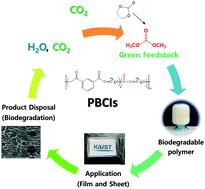Synthesis of a series of biodegradable poly(butylene carbonate-co-isophthalate) random copolymers derived from CO2-based comonomers for sustainable packaging†
Abstract
Aliphatic polycarbonates (APCs) are eco-friendly biodegradable plastics synthesized by using monomers derived from carbon dioxide (CO2). However, the poor thermal properties and the low transparency in the visible light region of APCs have limited their use in packaging applications. The aim of this study is to develop novel biodegradable aliphatic–aromatic random copolymers that can be used for the fabrication of transparent packaging films, by introducing dimethyl phthalate isomer esters into APCs. A series of high molecular weight poly(butylene carbonate-co-isophathalate)s (PBCIs) were synthesized from 1,4-butanediol (BD), dimethyl isophthalate (DMI) and dimethyl carbonate (DMC) via a two-step melt polycondensation process. The characterization results clearly demonstrate that the incorporation of DMI units into APCs remarkably improved the thermal and optical properties as well as the gas barrier performance of PBCIs. Increasing the fraction of DMI units resulted in the enhancement of the glass transition temperature and the thermal stability of PBCIs. By increasing the DMI unit fraction over 20 mol%, we could render the PBCIs fully amorphous with high transparency (haze < 8%, transmittance > 90%). The mechanical properties of PBCIs were closely related to the degree of crystallinity, which could be controlled precisely by tuning the DMI content in the copolymers. The optimized PBCIs showed tensile strength in the range of 1.0 to 23.7 MPa and a large elongation at break of up to 1600%. Moreover, increased gas barrier performance was observed in PBCIs with a higher DMI content, and the optimized oxygen barrier performance (∼34 cc m−2·day−1·atm−1) surpasses that of the commercial polyethylenes and biodegradable polymers (550 to 2300 cc m−2·day−1·atm−1). The enzymatic degradation behavior of the PBCIs was also investigated, where the biodegradation rate of the polymer can be adjusted by regulating the DMI content. The newly synthesized biodegradable PBCIs providing excellent transparency and gas barrier performance will serve as a promising candidate material for eco-friendly packaging applications.



 Please wait while we load your content...
Please wait while we load your content...